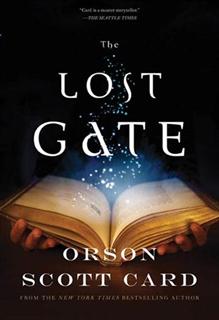 Orson Scott Card is best known for Ender's Game, Ender's Shadow and Speaker for the Dead.
He received the 2008 Margaret A. Edwards Award for lifetime achievement in YA
literature from the American Library Association. His novel Ender's Game (1985) and its sequel Speaker
for the Dead (1986) both won the
coveted Hugo and the Nebula Awards--making Card the only author to win both of
the U.S.'s top SF prizes in consecutive years. His latest novel is The Lost
Gate (Tor, January 4, 2011), the first
book in his new Mither Mages series.
Orson Scott Card is best known for Ender's Game, Ender's Shadow and Speaker for the Dead.
He received the 2008 Margaret A. Edwards Award for lifetime achievement in YA
literature from the American Library Association. His novel Ender's Game (1985) and its sequel Speaker
for the Dead (1986) both won the
coveted Hugo and the Nebula Awards--making Card the only author to win both of
the U.S.'s top SF prizes in consecutive years. His latest novel is The Lost
Gate (Tor, January 4, 2011), the first
book in his new Mither Mages series.
Card was born in Washington State and grew up in California, Arizona and Utah. He recently took a position as a professor of writing and literature at Southern Virginia University. He lives in North Carolina, with his wife, Kristine Allen Card, and their youngest child, Zina Margaret. Sadly, Card suffered a mild stroke earlier this month; he is recovering, and is now back home, retraining his brain so that the fingers of his left hand strike the keys he's aiming for.
On your nightstand now:
Then Sings My Soul, a collection of hymns and their (brief) histories that I'm considering as a textbook for the class in hymn and lyric writing that I'm teaching at Southern Virginia University this winter.
The Last Days of Ptolemy Grey by Walter Mosley. In my iPod Nano, I'm listening to President Bush's memoir, Decision Points.
 Favorite
book when you were a child:
Favorite
book when you were a child:
That changed from year to year! For a time, it was Mr. Mocker by Thornton W. Burgess, followed by Rabbit Hill by Robert Lawson and the Book of Mormon Stories for Young Latter-day Saints by Emma Mar Peterson. At about age eight, I graduated to Joseph Altsheler's Civil War series of YA novels. Then it was The Prince and the Pauper by Mark Twain, followed by Dawn's Early Light and Yankee Stranger by Elswyth Thane (from my mother's collection). I read C.S. Lewis's Screwtape Letters and was transformed, and when my parents gave me Dale Carnegie's How to Win Friends and Influence People I was transformed again--you mean you can actually learn how to get along with other people? After Gone with the Wind, I found Andre Norton's Galactic Derelict and The Time Traders, along with Heinlein's Tunnel in the Sky and Citizen of the Galaxy, making me for the first time a certified sci-fi reader. Then I went through an Agatha Christie phase in high school, and didn't come back to sci-fi until college, when Ray Bradbury's writing taught me about cadenced, poetic narrative, while Asimov's Foundation trilogy set me a standard for clarity of prose. In college I also had the normal Ayn Rand phase. For a time, every one of these books or authors was my favorite ever. I suppose I was rather fickle. But really, how long can Rabbit Hill be your favorite?
Your top five authors:
William Shakespeare (he taught me both characterization through motive and how to write in blank verse while keeping the language natural); Jane Austen (the greatest novelist who ever lived; her work is so self-contained yet captures her culture so thoroughly); J.R.R. Tolkien (The Lord of the Rings is the greatest work of literature in any language in the 20th century, even though in some ways he was creating the literature of the 10th century all over again); Isaac Asimov (the consummate master of the American plain style, nobody write with greater clarity, ever); Ray Bradbury (the consummate master of cadenced writing, filled with music yet always in the service of a strong story).
Joseph Smith is in a special situation, since his writings are tied up with revelation, scripture and theology, as he singlehandedly undid the entire Western philosophical tradition and rediscovered a primitive, non-neoplatonic Christianity. No matter what I write, both J.S.'s language and his worldview are inside my head, looking out.
Book you've faked reading:
I have never faked reading any book in my life. Not finishing a book is a strong review of it!
Book you're an evangelist for:
I've been trying to get everyone on Earth to read Neal Shusterman's Everlost and Patrick Rothfuss's The Name of the Wind and William Sleator's Singularity; and for years I've been pushing Robin Hobb's Ships series on anyone who would hold still. And if you haven't read Mette Ivie Harrison's Mira, Mirror, then git 'er done!
Book you've bought for the cover:
None. There are books I've picked up for the cover, or even for a cover quote, but the first few pages have to win me, and that's what I buy for. It doesn't mean I haven't been disappointed, but....
Books that changed your life:
Army of the Potomac by Bruce Catton and The Rise and Fall of the Third Reich by William L. Shirer when I was a fifth-grader. They both tore me apart but also gave me an understanding of politics, the military, history in general, and the depths and heights of human nature. More than any fiction I've read, these books formed me.
Favorite line from a book:
I'm not much of a book quoter. It's the story, not individual lines, that I hold in my memory.
Book you most want to read again for the first time:
I wish I could read any of my books for the first time, if only to know why some of them work with a large audience, and some of them remain favorites of only a few. To me, they were all wonderful as I was writing them, and painfully full of mistakes of every kind when I reread them. I wish I could read them all as my readers do, with no idea of what's coming.

